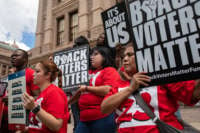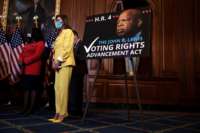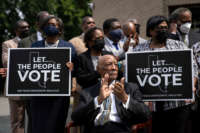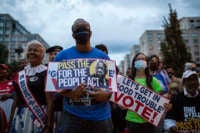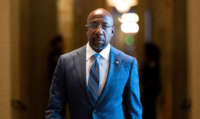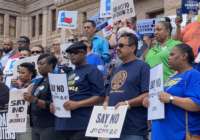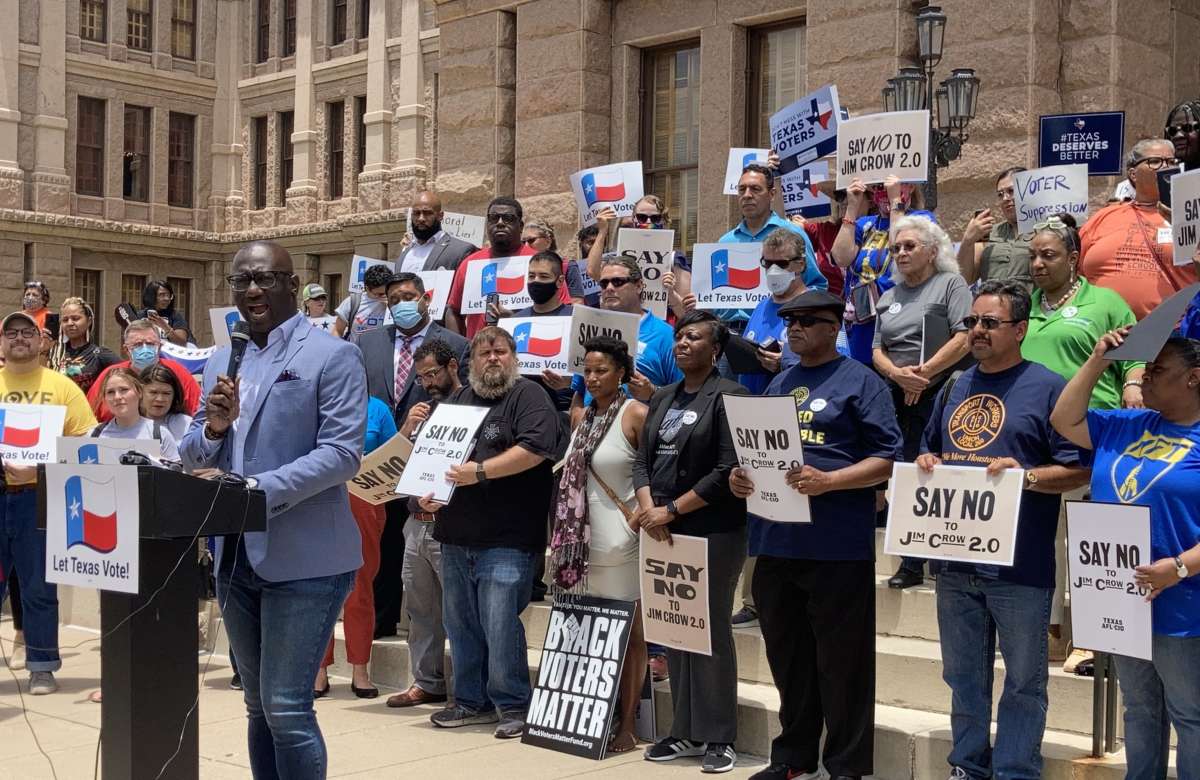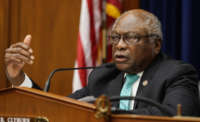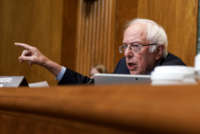
Organizers and activists in Louisiana and Mississippi are regionally coordinating their relief response in the wake of Hurricane Ida, and linking the immediate survival needs of people with a coherent set of political demands expressed in a petition to lawmakers including President Biden, calling for a humanitarian approach to evacuation and evacuees. Both initiatives draw on lessons learned from past disasters like Hurricane Katrina in 2005.
Kali Akuno, co-founder of Cooperation Jackson in Jackson, Mississippi, and Stephen Bradberry, executive director at the Alliance Institute in New Orleans, have joined forces to mobilize a political force to anticipate and counter any moves from the Shock Doctrine playbook: the process by which alert capitalists move in on vulnerable communities while they’re still reeling from whatever disaster has hit them, as described by Naomi Klein in her 2007 book.
Akuno and Bradberry remember the mass firings of 4,300 public school teachers in the aftermath of Hurricane Katrina, which led to an accelerated makeover of New Orleans’s public education system to a for-profit charter school system. They also remember the post-Katrina passage of a voting law that said people couldn’t vote in Louisiana elections without coming back to the state — measures that were enacted without community input, when few were around to fight back.
They especially want to make sure the resources that flow in are dedicated to supporting the communities most in need, and that funds are not siphoned off to highly compensated consultants and administrators of the resources intended to aid displaced people.
Crisis as Opportunity to Dialogue With the People
Ten families from New Orleans evacuated to Cooperation Jackson before Hurricane Ida made landfall in Louisiana on August 29. The next day 20 more also sought temporary refuge there, seeking safety from damaged dwellings, power and water outages not likely to be resolved for weeks, or even longer.
Akuno says Cooperation Jackson, which is dedicated to expanding democracy via the proliferation of worker-owned-and-run cooperatives, is partially filling the structural breach of “concern, care and preparation that we know is needed at this point — which we should have learned 16 years ago, very clearly.”
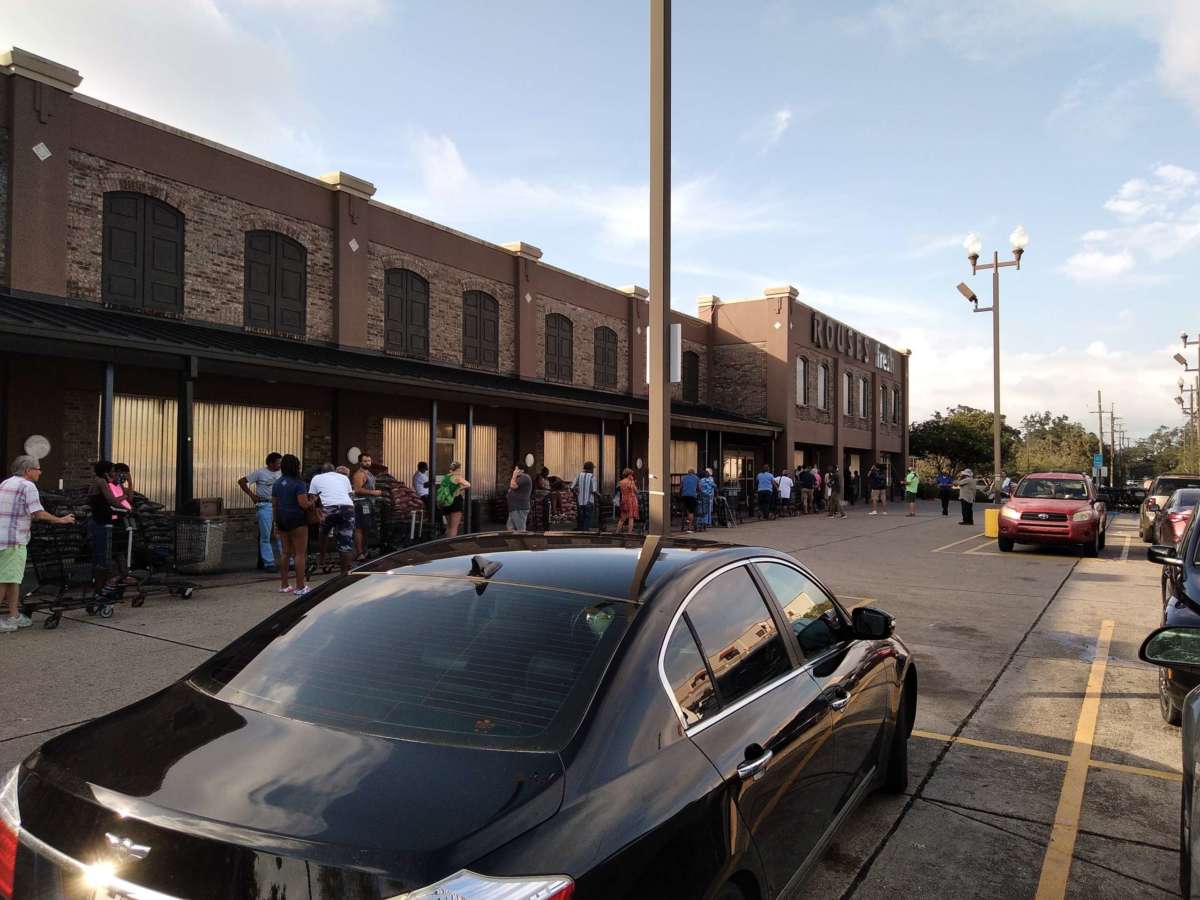
A survivor of Hurricane Katrina who led the Peoples’ Hurricane Relief Fund based in New Orleans after the storm, he knows firsthand the mix of anxiety, distress and frustration weighing on the evacuees. “Nobody wants to leave their community. We wanted to make sure they had a place to rest their heads,” Akuno told Truthout.
Akuno explained that he advocates for rational and democratic planning, decision making and resource sharing, in opposition to the laissez-faire approach of governments, which basically say, “Y’all have to fend for yourselves and good luck.” Mobilizing people and helping them gain the political confidence to demand better systems takes time and relationship-building, Akuno says, and in his decades-long experience as a community organizer he has come to know of an essential first step: “It’s important for people to know that there are other people who actually give a shit. You have to show them that you do.”
On Thursday, a van full of Cooperation Jackson’s members will embark on a mutual aid effort to distribute generators, solar-powered device chargers, potable water and canned food to people in Biloxi and Gulfport, Mississippi, as well as in New Orleans.
In addition to meeting people’s immediate needs, the group is delivering a message: It doesn’t have to be this way. Activists are communicating that in order to make sure that the rebuild is controlled on the ground as much as possible, it’s essential to build relationships, stay in touch and let each other know how we can support each other as we move through this crisis. They’re also emphasizing that mutual aid efforts can be paired with fights against the powerful systems that are hard to overcome, but that must be overcome.
“This is how we’ll forge the good, just and beloved community,” Akuno says. “We’ve got to organize that into existence. [Global] warming is already beating most of the models. We weren’t supposed to be at this point for another 20-25 years, but we’re already here. We have to come up with a survival plan based on what people think it will take, and what they’re willing to do.”
He recalls that after Katrina there was a policy choice not to provide decent-paying wages for people to return to the city to rebuild, clean up and work on their own homes. The result was the permanent displacement of around 50,000 New Orleanians. “People that could have come back had no viable way to do that,” he says. “We’ve got to create that road this time.”
He believes that affected communities are going to have to take that work up — and that they will. “One of the things that will help us this go round are the memories of how really bad it was 16 years ago. There’s still enough people … who went through that, and are still on the scene, and who still have those messages and can move on them in their communities. So we’re getting them on tap to mobilize, and that’s already started to take place.”
Anticipating the Shock Doctrine Playbook
New Orleans institutions like Tulane University are beginning to bus their people out because of the hazards of living in a debris-filled city without water and power, enduring temperatures in the 90s, isolated thunderstorms in the forecast and Tropical Storm Larry on the radar. As individuals who can continue to leave (an estimated 200,000 residents remained) to avoid the inconveniences and health and safety concerns, Stephen Bradberry, executive director of the Alliance Institute, has been outlining the necessary organizing pieces that in his view have to occur “to make sure that people’s rights are not trampled on, from the evacuation through the recovery.”
With limited power and intermittent internet access, Bradberry, a former ACORN organizer and recipient of the Robert F. Kennedy Human Rights Award for his work with Katrina survivors, created the petition as an intervention against the “things that I know are going to happen if we don’t get in front of it.” These include communications, supply chain (especially medicines like insulin), rent assistance and insurance issues as well as hiring practices and wages for the recovery effort, and legislative watchdogs.
“Anti-looting” rhetoric coming out of New Orleans’s city hall — at a time when many people don’t have the basic necessities for survival — makes this project even more urgent. The petitioners are demanding a humanitarian approach to the recovery that does not repeat the militarism on display after Katrina, when people in desperate need had to approach officers toting automatic weapons or soldiers garbed in full military regalia for basic help. The process was intimidating, especially for marginalized communities targeted by police, and help was often denied. “In order to have people safe and taken care of in the most humane way possible, we have to have a large number of people saying, ‘No, that doesn’t go down!’” Bradberry told Truthout.
To that end, the petition, which integrates the United Nations principles for Internally Displaced People (IDPs), sets forth demands and guiding principles meant to be a moral compass to make sure that sweeping changes aren’t enacted without the people’s voice being central to the process. The petition asks for a plan of return: “If you’re going to evacuate people, how are they going to get home?” Bradberry asks. It further demands that any evacuation plan must adhere to the UN’s guidance for IDPs — for example, people must be evacuated as close to home as possible and families must not be separated.
But in order to get these demands and the other economic and processual ones met, Bradberry advises that the petition will have to be backed up by a focused and consistent “birddogging of the state and federal legislatures and to some extent the city council.” He’s especially concerned about the major city election planned for November. “If people are not able to come back, how are their voting rights going to be upheld?” he asks.
Bradberry knows a public outcry will be necessary to push the Biden administration to take up the petition, “so that Biden sees that it’s in his interest to apply these principles.” Whatever the result, Bradberry sees it as “an opportunity to put our policies out in front of people where they can see they make sense and why they make sense.”
More broadly, Akuno hopes that Ida changes Biden’s orientation about how he’s going to tackle the climate crisis.
“The same political will that was exhibited in March 2020 when the governments of the world shut the global economy down because they were responding to a global pandemic, demonstrated that the political will to act with expediency can manifest in global change immediately,” Akuno said, emphasizing that this kind of dramatic action is necessary to avert the most catastrophic impacts of global warming.
This post was originally published on Latest – Truthout.
